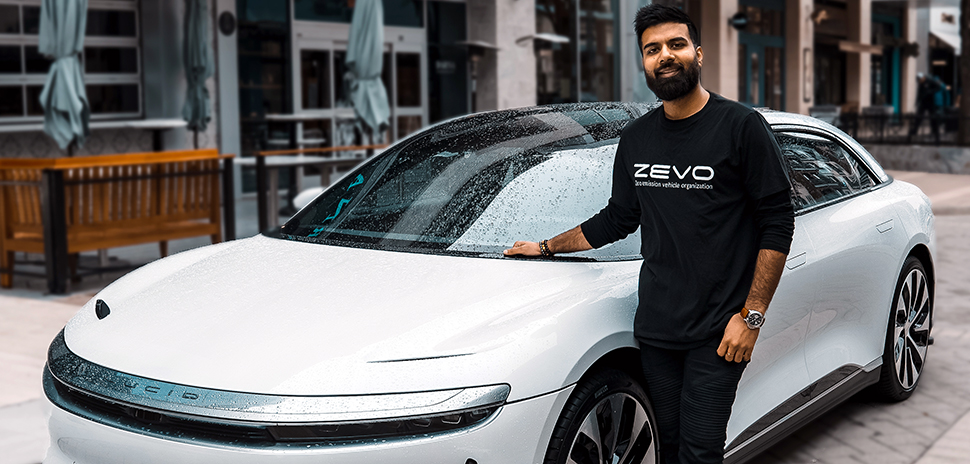Peer-to-Peer Electric Car Sharing: Rising Star Zevo’s Journey
In 2019, Hebron Sher found himself envisioning a future where Tesla’s fleet would evolve into a network of autonomous taxis, delivering on Elon Musk’s tantalizing promise. Sher, an experienced user of the car-sharing service Turo, was captivated by the idea of amplifying his profits with a self-driven Tesla. However, as time went on, this visionary proposal by Musk did not materialize. Consequently, Sher decided to take the initiative. Amidst the developments of 2021, he assembled a skilled team, with Saimah Chaudhry at the helm as a co-founder, to establish his venture.
They initiated a venture dubbed Zevo, which leveraged the principle of peer-to-peer car sharing – an approach that mirrored Turo’s core value proposition. What set Zevo apart, however, was its emphasis on electric vehicles. In a span of less than a year, Zevo, a startup rooted in Dallas, has seen substantial growth, and has also succeeded in securing $6 million in capital to facilitate its expansion in various primary U.S. cities.
Zevo has been making significant strides, with its annual recurring revenue (ARR) exceeding $8 million. It maintains a burgeoning waitlist that comprises over 3,500 customers, an impressive feat considering the little marketing efforts exerted thus far. Gig economy workers form a substantial fraction of the growing interest on the rental side of Zevo’s business with many of the platform’s users leveraging it to rent electric vehicles.
The platform’s appeal to about 90% of its users, largely composed of gig workers, can be attributed to its convenience for Uber, Lyft, and DoorDash services. Sher firmly believes that Zevo’s competitive advantage lies in its potential to maximize profitability for car owners while maintaining affordability for renters. The platform has gained recognition for its ability to generate lucrative returns.
With Zevo, Sher has been successful in recruiting proficient engineers, carving a strategic roadmap to penetrate the market, and instigating disruption in the conventional car-sharing landscape. Sher attributes Zevo’s ability to maximize returns for vehicle owners compared to other platforms like Turo to its focused operational approach. A key feature of Zevo’s operation is its contactless process, simplifying the exchange between owners and renters.
The unique process allows for car-sharing without a physical handover of keys or cards, providing convenience and safety. This feature goes hand in hand with other critical facets of car-sharing, including commercial insurance, that have been seamlessly integrated into the platform. Such features effectively rationalize intricate processes, making the platform an ideal choice for gig workers.
Zevo’s intuitive design, devoid of bureaucratic hurdles, has led users to draw parallels with MetroPCS in the car rental sector. Zevo’s advanced features have allowed for the automation of these processes, adding to its growing appeal among gig economy workers.
Alongside the aforementioned benefits, electric vehicles’ reduced maintenance requirements — resulting in more uptime — enhance Zevo’s appeal to those who rely on gigs for their livelihood. The impact of these features is evident in Zevo’s early performance, with the platform recording a median rental period of approximately 80 days.
Car owners, who serve as hosts on the platform, have seen remarkable returns, with earnings ranging from 35% to 65% of their vehicle’s cost within a year. Given that 90% of cars on the platform are Teslas, Sher holds a strong conviction in Zevo’s potential to fulfill Musk’s 2019 vision in a unique, yet equally promising manner.
Sher’s primary objective for Zevo is to be a disruptor in the car-sharing industry. With a lean team of 30 and minimal additional investment, Sher is confident that Zevo could surpass the $100 million mark in ARR.
Even if Tesla realizes its robotaxi vision and impacts the gig economy, Sher believes there’s still ample opportunity for Zevo. According to him, meeting the total demand for rides and deliveries would require a phenomenal increase in car production.
Sher contends that there’s more than enough room for everyone in this burgeoning sector. His optimistic view invites competition and indeed, innovation. His dedication to disrupting the car-sharing industry through Zevo is unwavering in the face of potential future challenges.

